Lavender is a fragrant herb that has been used for centuries for its calming and relaxing properties. The plant, which is native to the Mediterranean region, has a long history of use in herbal medicine, and is known for its various health benefits.
One of the primary herbal actions of lavender is its ability to act as a nervine, which means that it can help to calm and soothe the nervous system. This makes it a popular choice for people who are experiencing anxiety, stress, or insomnia. In fact, lavender has been shown to be effective in reducing anxiety and promoting sleep in several clinical studies.
In addition to its nervine properties, lavender is also known to have anti-inflammatory and antiseptic properties. It can be applied topically to the skin to help reduce inflammation and soothe irritation, and it can also be used as a natural disinfectant to clean cuts and wounds.
In terms of folklore, lavender has long been associated with love and romance. It is said to have been used by the ancient Egyptians as a perfume, and was also believed to have aphrodisiac properties. Lavender was also believed to have spiritual properties, and was often used in spiritual rituals and ceremonies.
In terms of energetics, lavender is considered to be a cool, dry herb with a sweet, floral aroma. It is said to have a balancing effect on the body and mind, and is believed to be helpful for those who are feeling overwhelmed or stressed.
Overall, lavender is a versatile and beneficial herb that can be used in a variety of different ways to promote relaxation, reduce anxiety, and support overall health and well-being. Whether you use it as a calming tea, a soothing massage oil, or as a natural remedy for cuts and wounds, lavender is sure to be a valuable addition to your herbal medicine cabinet.
Lavender (Lavandula augustifolia)
Family: Labiatae
Parts Used: Above ground parts in flower
Taste – Bitter (stimulates Digestion)
Aromatic (the floral flavor/smell of lavender)
Astringent (Tighten & tones tissues)
Actions
Bitter Tonic – Specifically a digestive and nervine bitter. Have a tonifying and supportive effect on the gastrointestinal tract.
Nervine Relaxant/sedative – Influences the nervous gently relaxing tension, bringing the vital force down & in, Calming the nervous system down
Analgesic – This is another name to basically refer to a pain relieving herb. This action through Skullcap happens through the plants ability to relax the muscles which in turn may ease pain.
Affinites:
Nerves – This is the primary physiological area of focus for this remedy and is the root of a majority of its medicinal properties.
Musculoskeletal – as all muscles are integrated with the nervous system.
Energetics: Qualities
Cooling – Sedates heat & excitation in tissues. It brings the energy down. (Whole System) Drying – Long term use will have a drying effect on the constitution. Increases secretions that are ultimately leaving the body.
Relaxant – Nervous system related to whole body.
Stimulating – Digestive.
Specific Indications:
It is specific for headache, muscle spasms, convulsions, and symptoms due to nervousness related to a lack of circulation to the brain.
Lavender is a beautiful aromatic herb prized for its medicinal, culinary, and cosmetic uses. It is both calming and uplifting as its strong aromatic properties perpetuate calmness, soothing and settling the nerves




